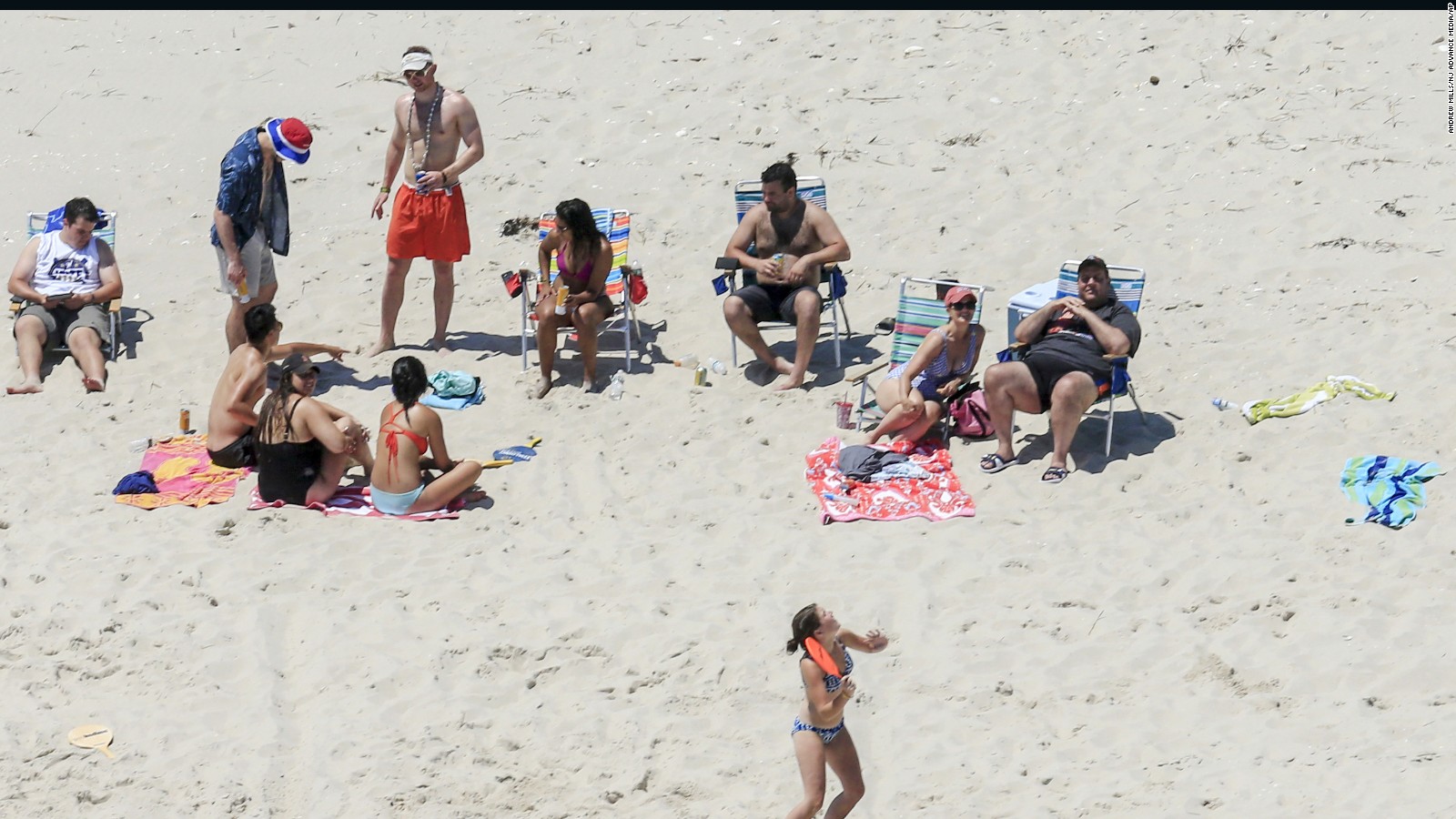Reining In Beach-Spreading, Not to Be Confused With Manspreading
POINT PLEASANT BEACH, N.J. — The texts detailing beach coordinates went out to more than two dozen family members, but they really weren't necessary.
Monique Jefferson and Tavoy Weal's setup for their annual family beach day is hard to miss: four canopies of different colors (one equipped with a mosquito net); an assortment of sheets spread on the sand; a stereo inside one of the tents; a volleyball net; and a foldable table to serve homemade macaroni and cheese, chicken salad, tuna and buffalo chicken.
"We make it a whole day thing," said Ms. Jefferson, 34, a teacher's assistant. Last year, the beach here was packed, she said, and the families were irritated. This year, a cool morning fog kept the morning crowds at bay, and they were able to spread out unbothered and unchallenged.
Some beaches along the New Jersey shore are actually shrinking, gnawed at year after year by waves and hurricane swells with many still awaiting major restoration work from the federal Army Corps of Engineers.
But while the sand may be disappearing, the encampments are booming.
Call it beach-spreading.
In the already overcrowded environs of the Jersey Shore, an epidemic of beach accessories with extensive sandy footprints has set off competitive jockeying for precious space as day trippers and locals haul towering pop-up tents, grills, tables, coolers and cabanas that obscure ocean views and leave little room for fellow beachgoers.
The phrase was coined by Amy Rosenberg, a reporter who covers the Jersey Shore for The Philadelphia Inquirer, and stems from a similar phenomenon found on New York City subways — manspreading — in which boorish men spread their legs wider than their allotted space and take up seating area at the expense of others.
"In the last few years I've been noticing more people with their gear," Ms. Rosenberg said. She was originally looking to make a comparison between beach-spreading maximalists and just-a-towel-and-a-book minimalists. "But the maximalists just won over,'' she said. "Because that's all there really is in New Jersey. It's the maximalists."
It has become such a scourge that towns are now taking steps to rein in the expansive behavior. This year, Seaside Heights imposed limits on cooler and tent sizes and banned "serving trays, warming trays, pots, pans," and other food preparation "devices." Belmar has introduced legislation to ban tents. Manasquan already has similar rules, but added a ban on balls.
"It's to the point that it looks like tailgating at MetLife stadium," Matt Doherty, the Belmar mayor, said. "And I love tailgating at MetLife stadium, I really do. It's just not what we're looking for on the beach."
On just about any given sunny weekend or weekday, evidence of the contagion is rampant.
With a tall, black pop-up cabana and the nasally vocals of Omi's "Cheerleader" wafting across the beach, Andrea Julius and her friends from Philadelphia spread out toward the back of Jenkinson's beach here to celebrate her 29th birthday.
"We like to be secluded but still connected to everyone, and this tent does it," she said, while two friends volleyed a beach ball nearby.
They were, of course, there on a Tuesday, and the surrounding space allowed them some courtesy.
"We're respectful back here,'' Ms. Julius said. "All they have to do is tell us, and we'll turn it down or take it down.''
On the weekends the situation can get thornier.
Farther down the beach from the Weal spread, Rob Trumbo, 31, and Jessica Helfrich, 31, opted for foldable beach chairs, even though they usually bring along an umbrella, which wasn't really necessary since the sun was hidden behind clouds.
While beach gear is often readily attainable at boardwalk shops, sometimes a simple cabana won't do.
"We had a guy last year bring in a coffin," said Mayor Anthony Vaz of Seaside Heights. "I'm not lying, a wooden coffin with his food and his drinks and so forth. And we said, ‘No we can't have that.'''
In Ocean City, many beaches on the northern stretch have become noticeably narrower over the years, with high tides inching ever closer to the dunes.
So with real estate at a premium, beach-spreaders have to be creative.
On a sunny and humid early Sunday recently, the town's beaches looked a bit like a ghost town: Empty chairs ringed empty towels in the sand. One encampment had a canopy, four umbrellas and a several beach chairs.
Their absentee owners were claiming their turf before the usual hordes descended on the beach.





